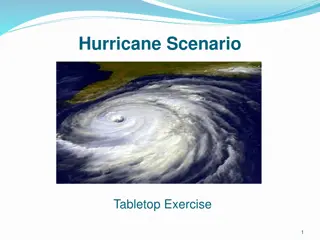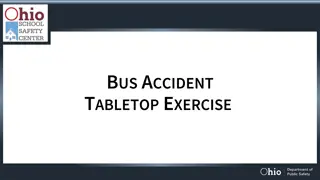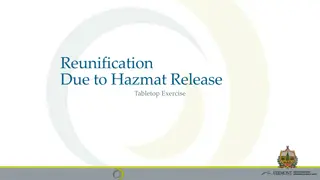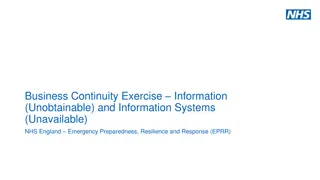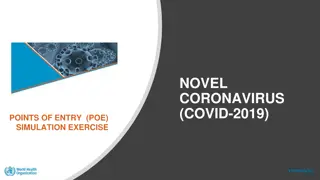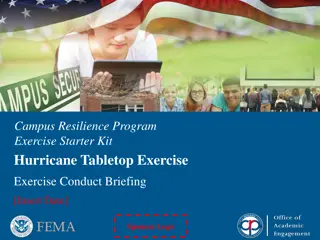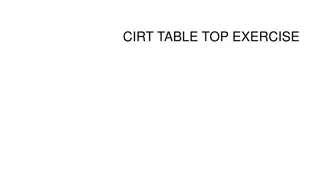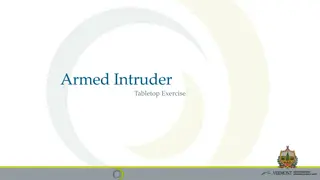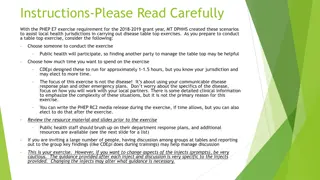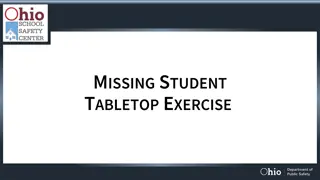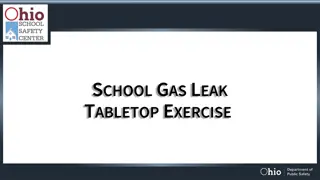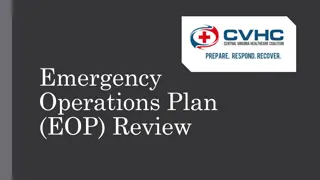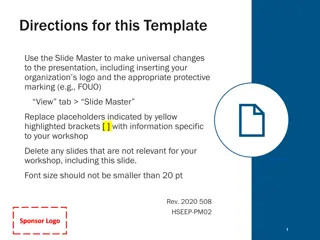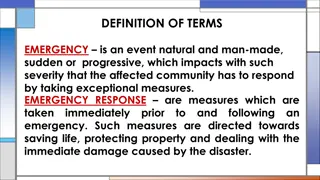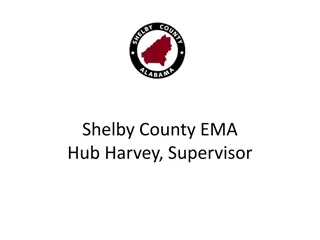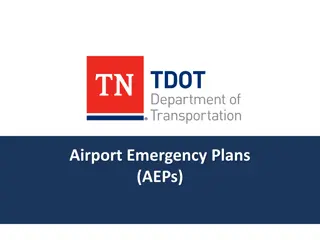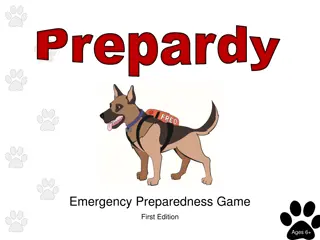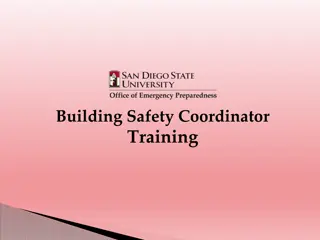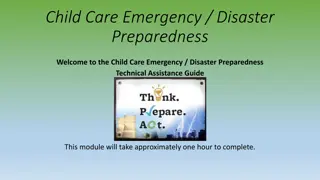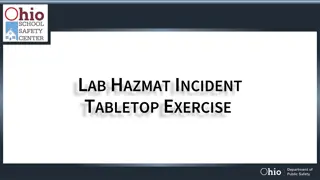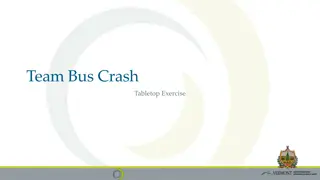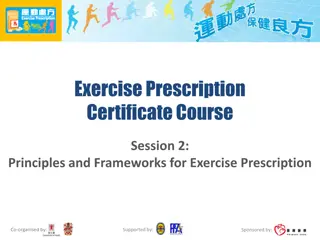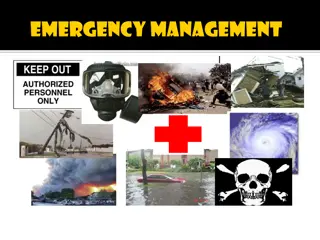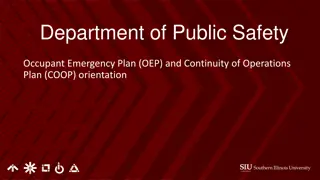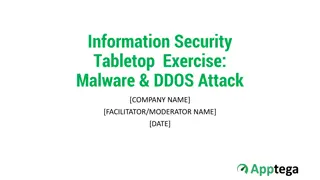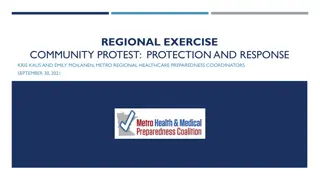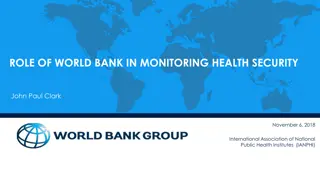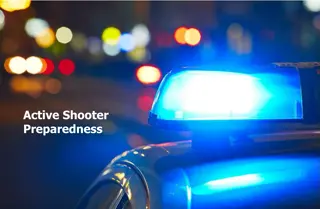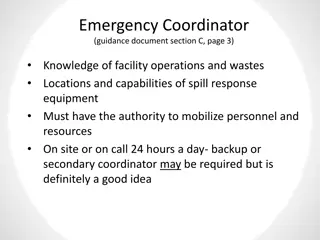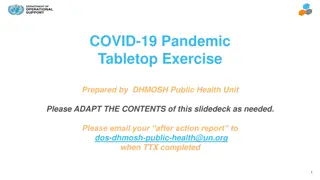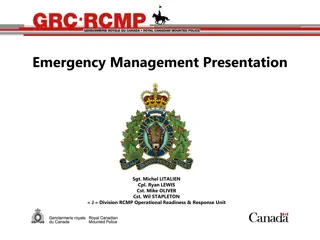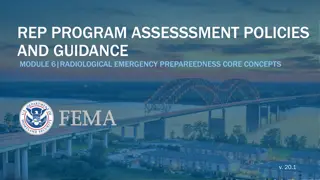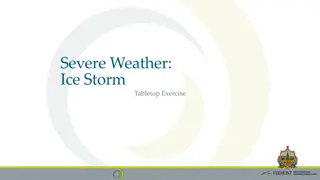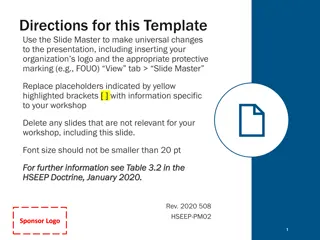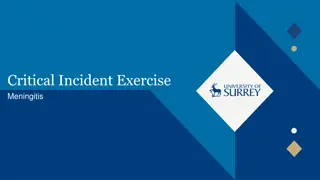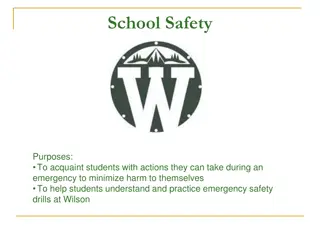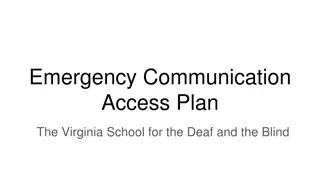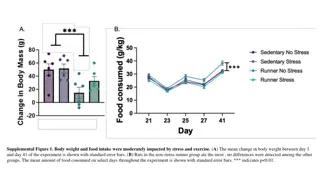Effective Exercise Design for Emergency Preparedness & Response
Develop a thorough understanding of exercise goals, objectives, and scenario development in emergency preparedness and response. Learn about the eight essential steps, including assessing needs, defining scope, and crafting narratives. Enhance your capabilities and readiness through examples and practical guidance presented in this comprehensive resource.
Download Presentation

Please find below an Image/Link to download the presentation.
The content on the website is provided AS IS for your information and personal use only. It may not be sold, licensed, or shared on other websites without obtaining consent from the author. Download presentation by click this link. If you encounter any issues during the download, it is possible that the publisher has removed the file from their server.
E N D
Presentation Transcript
Exercises Identifying Goals and Developing a Scenario Chad Ostlund, CEM Emergency Preparedness & Response Health Partnerships Division
Agenda Goals and objectives of exercises Eight steps in exercise design Developing a scenario
Todays Objectives By the end of this webinar you will be able to: Define exercise goals & objectives Effectively use the eight steps in exercise design Develop a scenario
HSEEP Reminder Homeland Security Exercise & Evaluation Program Use the tools that work for you https://www.preptoolkit .org/web/hseep- resources
Overarching Goals & Objectives PHEP Capabilities Agency- Specific Goals Objectives Examples
Eight Steps in Exercise Design 1. Assess Needs 2. Define the scope 3. Write a statement of purpose 4. Define objectives 5. Compose a narrative 6. Write major and detailed events 7. List expected actions 8. Prepare messages
Step 1: Assess Needs Capabilities, Capabilities, Capabilities Begin with your plan Learn from past exercises JRA/THIRA Assessment results
Step 1 Example Assess Needs Capability 6 Information Sharing Weakness: Gap in Information Exchange Corrective Action: Review and update process for MDH Department Operations Center (DOC) to request and receive local public and tribal health information from PHPCs.
Step 2: Define the Scope Scope includes: - Capabilities - Type of emergency/hazard - Location - Participants - Exercise type - Duration
Step 2 Example Scope Statement This is a 2.5 hour functional exercise for MDH ICS response staff operating in the MDH Department Operations Center. This exercise tests emergency operations coordination in a train derailment scenario.
Step 3: Write A Statement of Purpose Broad statement of the exercise goal Use it for media
Step 3 Example Purpose Statement MDH will conduct a 2.5 hour functional exercise on May 20, 2016 at the MDH department operations center to evaluate the ICS response staff s ability to develop an incident response strategy to a chemical spill from a train derailment.
Step 4: Define Objectives Objectives are essential for: Design process Exercise conduct Evaluation Improvement planning
Step 4: Objectives Clear, concise, focused on performance State WHO should do WHAT under WHAT CONDITIONS according to WHAT STANDARDS Tabletop 3 to 5 objectives Functional 4 to 6 objectives Full scale 7 +
S.M.A.R.T.? Coordinate with faith-based community leaders to assess the availability of health information for their community with language barriers.
S.M.A.R.T.? Environmental health staff will complete inspections within 3 days for Springfield s 45 licensed restaurants and grocery delis to allow them to reopen after a 24- hour power failure.
Step 4 Example Objectives 1. Healthcare Surge group supervisor will establish a briefing schedule with the MDH Health Regulation Division to maintain situational awareness before the next operational period. 2. The MDH Public Information Officer will coordinate with MDH subject matter experts (environmental health and long term surveillance staff) and with the joint information center to provide health information to the affected population before the next operational period.
Step 5: Compose a Narrative A brief description of the events that have occurred up to the minute the exercise begins. Provided in the Situation Manual (tabletop exercises) and the ExPlan (for functional or full scale exercises)
Step 5 Example Compose a Narrative A train derailment occurred in Little Falls, MN on Sunday, Sept 13 at 4:45 PM at the intersection of Broadway Avenue & Highway 23. Three train cars carrying hazardous materials derailed. One car is on fire and leaking into the Mississippi River. A large portion of the city s population was evacuated to shelters.
Step 6: Write Major and Detailed Events What they are Provide a structure Care is necessary
Step 6: Write Major and Detailed Events Major Events Big problems Realistic actions Detailed Events Specific problem situations Expected actions
Step 6 Example Write Major and Detailed Events Twenty-five people from Highland Assisted Living were deemed not appropriate for a general population shelter and were sent to the hospital in St. Cloud. The hospital is requesting a list of available beds in skilled nursing facilities, including 10 memory care beds. Can MDH assist?
Injects Link simulation to action Enhance exercise experience for the players Prompts player action How to write
Create an Inject LPH will coordinate with response partners to conduct shelter assessments of population registering at local shelters during day 1 of incident.
Step 7: List Expected Actions Expected Actions Types of Actions
Step 7 Example List Expected Actions Health Care Surge will send out survey to skilled nursing facilities in Central region. Share information with Operations Chief and other DOC staff in a briefing or email.
Step 8: Prepare Messages Characteristics Message, events & actions Composing the message
Pulling It Together Master Scenario Events List (MSEL) Development Best practices
Scenario Development Steps for all exercises 1. Use agency experts 2. Make scenario realistic 3. Draft and review 4. Talk-through 5. Finalize
Upcoming Webinars October 5: Conducting the Exercise October 19 and/or 20: Evaluating the Exercise and Creating an After-Action Report/Improvement Plan (AAR/IP)
Contact Information Chad Ostlund 651-201-5660 chad.ostlund@state.mn.us


